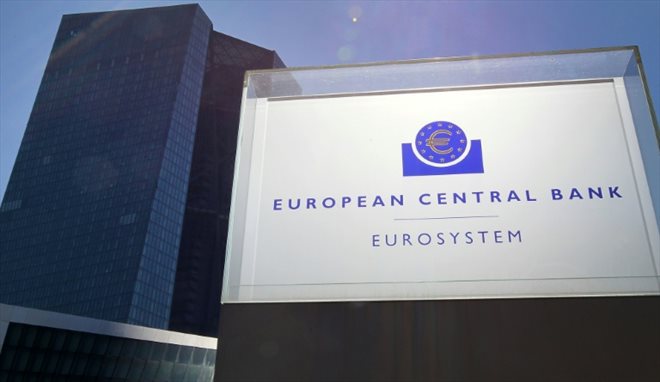The ECB headquarters in Frankfurt, June 15, 2022 (AFP/Archives/Daniel ROLAND)
Inflationary pressure is decreasing in Europe but the European Central Bank wants more guarantees before easing its monetary policy and lowering its interest rates, which were maintained at a record level on Thursday.
The rate on deposits, which refers, remains at its historic high of 4%, as since October, the institution decided at the end of the meeting of the Board of Governors.
The markets are always on the lookout for clues on the timetable for future relaxations.
Questioned at length by the press on Thursday, the President of the ECB Christine Lagarde did not reveal her game: “we are progressing well towards our inflation objective” but “we are not sufficiently confident” about the price dynamics, declared the French.
In a cryptic manner, she assured that the Governing Council “did not at all” discuss a reduction in rates, but that it “barely” began to talk about “retreating from its restrictive position”, evening the high cost of renting money which slows down the economy.
In terms of timetable, the Frenchwoman has, without saying it explicitly, opened the way to a possible rate reduction in June, declaring that the ECB will know “a little more in April”, and “a lot more in June” to feed its economic dashboard.
The markets have also recently pushed back their expectations to June.
This is the moment when there will be enough data “either to confirm that the inflationary beast has really been brought under control, or to indicate new upward pressure on prices”, comments Carsten Brzeski, at ING Bank.

ECB President Christine Lagarde, arriving at the press conference in Frankfurt on March 7, 2024. (AFP/Kirill KUDRYAVTSEV)
The ECB lowered its inflation forecast for 2024 in the euro zone on Thursday, seeing it fall to 2.3% due to the weaker impact of energy prices. The institution now expects it to reach its 2% target in 2025.
The central bank still wants to ensure that this trend is sustainable.
– Turning in June? –
After having been divided by three between the record of 10.6% reached in October 2022 and autumn 2023, inflation is evolving in a more hesitant manner.

The ECB keeps its rates unchanged (AFP/)
It slowed to 2.6% in February, less than expected and so-called core inflation, that is to say without the very volatile prices of energy and food, slowed to 3 .1% in February, still well above 2%.
The ECB does not want to relax its efforts and risk compromising the effects of its unprecedented monetary tightening campaign carried out since July 2022 to control the surge in prices caused by the Russian war in Ukraine.
By increasing borrowing costs at an unprecedented rate, demand for credit has been dampened, affecting consumption and investment by businesses and households alike.
The downside of this policy: the euro zone economy has been stagnating for almost a year and a half and economists judge that the institution is erring on the side of caution, risking compromising a rebound in activity.
In these new macroeconomic projections unveiled on Thursday, the ECB lowered its GDP growth forecast for the euro zone in 2024 to 0.6% compared to 0.8% previously. It expects 1.5% next year, as in December, and 1.6% in 2026, compared to 1.5% previously.
– Wages –
The US central bank, which will meet on March 19 and 20, is expected to adopt the same cautious attitude, after its president Jerome Powell said on Wednesday that developments on the inflation front “are not assured”.
But whatever its big American sister does, the ECB will act “independently”, insisted Ms. Lagarde.
The institution closely monitors “pressures on domestic prices” which “remain strong, in part because of strong wage growth”, as highlighted on Thursday.
After three years during which prices rose faster than wages, a catch-up is taking place through social negotiations in companies and professional sectors.
These demands are particularly strong in Germany where a new strike paralyzes rail and air transport on Thursday.
© 2024 AFP
Did you like this article ? Share it with your friends using the buttons below.




